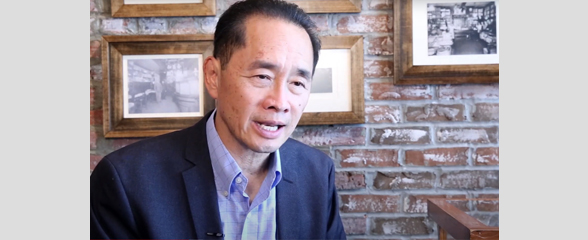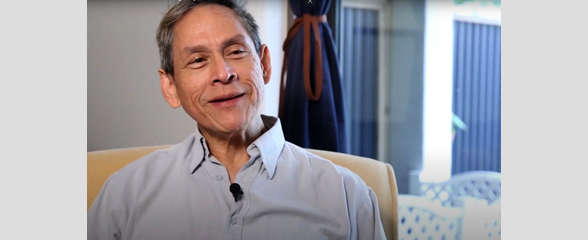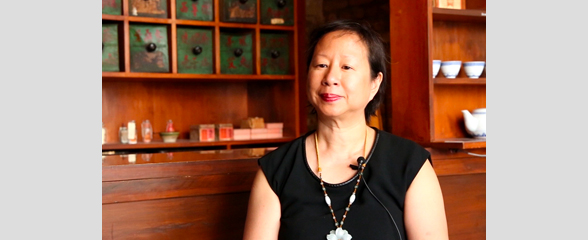Chinese--Migrations

2018.034.002 Oral History Interview with Ti-Hua Chang
In this oral history, MOCA interviews Ti-Hua Chang, a Chinese American television news reporter who was the first journalist to cover the story of the Golden Venture when it ran aground off Rockaway Beach, Queens, on June 6, 1993. He discusses how he was first informed about the Golden Venture and the process of reporting on the event. Chang recounts how his news station had brought in an anti-immigration lawyer to speak on the story, and how he felt compelled to speak up to counter the lawyer’s hate rhetoric, launching into a speech about Chinese Exclusion and anti-Asian racism in the United States. His coverage continued during the detainments. He reveals that the ten individuals who drowned during the Golden Venture voyage were kept in the New York City morgue for months because no one wanted to bury them, and they were eventually sent to a pauper’s grave, where they were buried in stacks of five, which according to Chinese superstition, meant that their souls would never be at peace. When Thomas Sung, of the Abacus Federal Savings Bank, heard about this, he donated money to have the drowned individuals buried in separate plots. Chang speaks about the racist attitudes towards Chinese people in the United States and the issue of organized crime in the Chinese community. He believes that the Golden Venture passengers were unfairly detained to be made examples by the United States government to discourage Chinese undocumented immigration. He believes that the United States owes reparations to Chinese people, who built the Transcontinental Railroad and were integral to the development of this nation, and yet were met with Chinese Exclusion. Finally, he stresses the importance of having diverse newsrooms and journalists who would have the cultural competency to cover diverse stories.

2018.034.003 Oral History Interview with Fernando Chang-Muy
Fernando Chang-Muy has had a long career in immigrant and refugee legal advocacy, including as staff attorney and Director of the Southeast Asian Refugee Project at Community Legal Services in Philadelphia, and as Legal Officer for the UN High Commissioner for Refugees (UNHCR). He currently teaches Refugee Law and Policy at the University of Pennsylvania School of Law, and Social Work and Immigration in its Graduate School of Social Policy and Practice. At the time of the Golden Venture, he was involved in training attorneys in York County to represent Chinese immigrants who had been transferred to the local immigrant detention center. In his brief historical overview of the then existing legal infrastructure, Chang-Muy explains that asylum law was relatively new and legal practitioners were few, thus highlighting the importance of the Pennsylvania Immigration Resource Center’s (PIRC) development of legal training. His historical overview also covers the 1986 Immigration Reform and Control Act, the 1996 Illegal Immigration Reform and Immigrant Responsibility Act, a history of America as country of immigration and refuge for Quakers, Chinese, Central Americans, Syrians and other groups, the raising and lowering of refugee resettlement quotas under various presidents, and attempts to stop the entry of Muslim refugees in the era after 9/11. He gives in-depth legal expertise on the applicability of due process to the Golden Venture Chinese, reasons for prolonged detention, and issues of concern in the immigration detention and asylum process and system. Chang-Muy then pivots to discuss desired visitor takeaways from the MOCA FOLD Exhibition. The oral history ends with a brief discussion of his personal and family history, including the immigration of his father from Cuba as a refugee, and its influence on his decision to pursue a career in immigration law.

2018.034.007 Oral History Interview with Elizabeth OuYang
Elizabeth OuYang is a Chinese American attorney who has advocated for immigrant and Asian American civil rights for more than three decades. At the time of the Golden Venture, OuYang was a staff attorney at the Asian American Legal Defense and Education Fund (AALDEF) tasked with advancing voting rights and prosecuting hate crimes, and in this capacity, she assisted with interviewing Golden Venture Chinese who were detained at the Varick Street detention center. In addition to this work, topics of her oral history also include the legal landscape of immigration in the 1990s and post 9/11; her work representing Arab Muslims and South Asians; the impact of the broken immigration system and Trump administration on undocumented immigrants; the rise in hate crimes against Chinese and Asian Americans following the grounding of the Golden Venture; and desired visitor takeaways from MOCA’s FOLD exhibition.